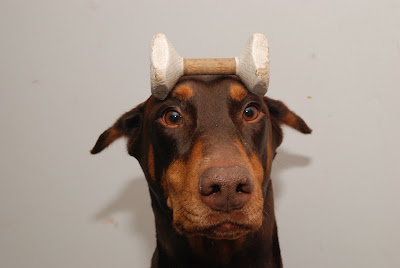Recently, this group had a thread running about not just retrieving, but how important the perfectly fitted dumbbell would be to the success or failure of any given retrieve. HUH? I would read one of these posts and all I could think to say was, "Why not train the dog?"
A poster would write, My dog already knows how to retrieve, BUT:
"...DOES chomp on the dumbbell and this is a problem. Can you give me suggestions on how to break this. Do I need to start over from the beginning and ... train her?"
"...only starts chomping when she comes..."
"...has started refusing to pick up the dumbbell some times..."
"...refuses to pick up the dumbbell when it lands in grass..."
"...sometimes drops the dumbbell..."
That is just a sample of excuses/problems that I hear or read about. To one and all, I say, "stop making excuses and train the dog".
So does the retrieve problem show up because the dumbbell is too big? Here is a clear-cut case of that being a problem.

In this case, the dumbbell isn't too big for the dog to handle on a regular basis, it is TOO BIG. The Maltese model who posed for this picture and the following pictures has actually done a retrieve on the flat with this dumbbell. He really does know "fetch" and has the heart and brains of dogs weighing 15 times his size.
Perhaps the refusal to retrieve correctly is being caused by the dumbbell being too small.


Then again, maybe the bit is too long, too short or too thick.

By all means do choose a dumbbell that is a comfortable fit, but not so light, with such a thin bit that the very act of retrieving is moved from useful work to cute trick.







A thank you is due Sam Daley for her great photography skills. And another thank you is due to my canine models, Sanity, Rugby and Jasmine. They are so patient and willing every single time I get the urge to have a photo shoot.
I was all ready for a serious post, with walls of text, and instead am giggling like a loon at the dumbbell-as-hat photo.
ReplyDeleteAs for all the "s/he knows how to... BUT" comments, I'd have to wonder how many were trained with a low criteria. It's not enough for the dog to pick it up and bring it back- there has to be rules for holding, speed of carry, and so many other things, or the dog starts with the "technically" crap. "Technically, I'm doing what you wanted. Just no the ~way~ you wanted."
(While I still have trouble telling one red Doberman from another, I believe Sanity is the slightly darker, slightly shorter ear crop Doberman on the left in the last photo?)
Yep,that's her. She is turning out to be a pretty good model and willing to put up with just about anything in the way of foolishness where the camera is concerned.
ReplyDeleteI actually hadn't realized just how much bigger and darker she is and I confess I do so love her ear crop. Don't know what I would have done had she shown up here with a donkey crop.
Great photos. I love the Doberman with the small dumbell in the mouth. Great expression on the face!!! OMG, this really cheered me up today. Funny.
ReplyDeleteUnfortunately, I believe that many people teaching and attempting to train for "obedience" today have lost the basic concept of the word. Obedience means just that. It doesn't mean, "I'll do it if I want to in the moment", "I'll do it because I love you", "I'll do it except for...", or "I'll do it for the treat you have in your hand or pocket".
ReplyDeleteThe retrieve is not "manners training" and as such it suddenly becomes an entirely different matter for those people whose dogs only fit into the mold above. Retrieving, especially for dogs who don't take to it somewhat instinctively, requires a sense of discipline on the part of the owner/handler as well as the dog.
Discipline?! Yes, that's another dreaded word not found often enough in conjunction with the word "obedience". It requires a thought process, rather than a simple "do part A, get part B in return" relationship between dog and handler. In fact, a dog with a working retrieve (as opposed to the play retrieve, retrieve when food is smeared on the bit, or retrieve when the dog feels like it) helps to establish a much deeper relationship between dog and owner. I know because I reached such a place with my dog, and I miss him more than any other now that he's gone.
The retrieve is an exercise where the wheat is separated from the chaff, so to speak, when it comes to trainers, be it the instructor or the handler. A dog that doesn't respect you is one day not going to retrieve for you. A dog that has been taught in a structured fashion that "I must" will do whatever it can to follow through with the order, and that dog will trust that the outcome will be more than fair.
I think some people fear the term "working retrieve" or "forced retrieve" because they feel that some type of cruelty must occur at some point during training. I think it much more likely that such doubters have dogs which are not recognized for their natural intelligence, ability, talent, and "dogness", and therefore are, in a sense, being cruel to their pets.
A dog taught a working retrieve views the world in a different way. That dog has a higher sense of responsibility and maturation. That dog is more reliable and a better companion all-around. And that dog wouldn't be that way if it feared unfairness or cruelty on the part of an owner.